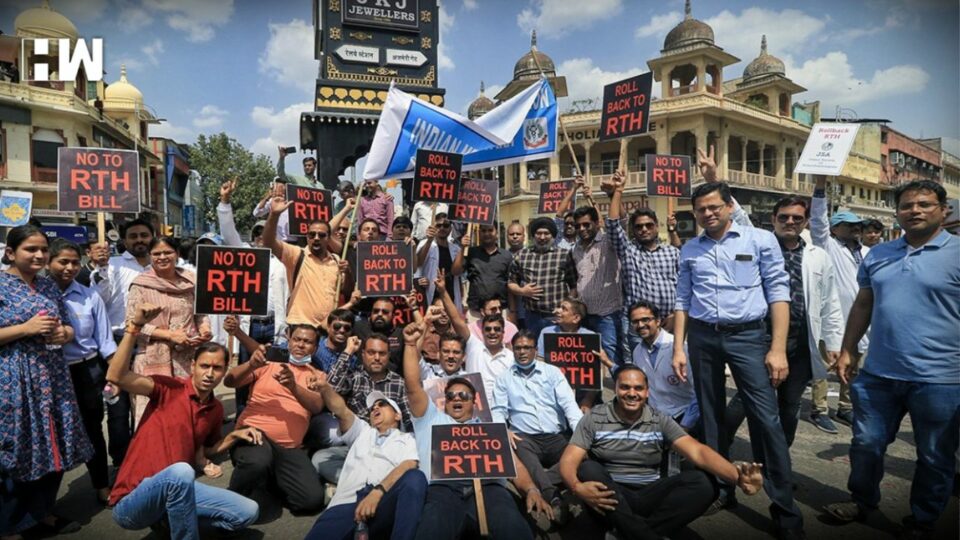On Monday, thousands of doctors and medical professionals took to the streets of Rajasthan’s Jaipur. According to an estimate, about 20,000 doctors, their family members, and people associated with the medical profession including medical shop owners took part in the rally which started from the resident doctors hostel ground of the SMS Hospital. Even days before the massive rally, several nursing homes and hospitals remained closed due to a general strike called by the doctors and other medical professionals. Several patients were stranded, surgeries delayed bringing a pressure on the state’s healthcare system. Now, All of these doctors and medical professionals belonged to or were related to Private hospitals in the state.
Last week, Rajasthan passed Right to Health Bill in the assembly becoming the first state in the country to do so. In the post-Covid years, the Ashok gehlot govt of Rajasthan has given special emphasis on govt health schemes with the aim to establish Rajasthan as a model state in Healthcare. The state already has several popular health scheme. Adding to the list, the state assembly last week passed the right to health bill which provides every resident of the state the right to avail free Out Patient Department (OPD) services and In Patient Department (IPD) services at all public health facilities. Also, similar healthcare services will be provided free of cost at select private facilities. the bill was passed amid clamour and opposition from BJP.
The Congress-led government tabled the Right to Healthcare Bill, 2022 in the Rajasthan State Assembly in September 2022. The Bill provides rights to patients and healthcare providers, places the obligation on the government to protect these legal rights and mandates the setting up of grievance redressal mechanisms. The preamble of the bill states that it will lead to “progressive reduction in out-of-pocket expenditure in seeking, accessing or receiving health care” for patients. Under this scheme:
many of us, might have had this experience, if not then good. But some of us have had this experience where you have an emergency situation, you reach the hospital, but you are asked to deposit certain amount before proceeding to the treatment, now in case the amount is hefty, and you can’t arrange the money upfront? then what? This bill primarily addresses this question. It states that no person should be turned away by Private hospitals, in case he is not able to pay for the treatment at the time. And in case if a patient is unable to pay the charges for emergency care, stabilisation or referral, the government will reimburse the health care provider. Not only that, your transportation, means the ambulance facilities will be available at no cost too.
5. Clause 4 of the Bill shifts the burden of responsibility in providing adequate medical services to the government. The government is “obligated” to provide funds, set up institutions and constitute grievance redressal systems. They must take the initiative to set up a State Health Authority and district health authorities. Beyond resolving complaints, the authorities would be tasked with planning healthcare services, monitoring services and conducting routine clinical, social and economic audits.
The main contention of The Private health facilities and doctors is that the state is passing off its obligation of ensuring equitable access to health to Private hospitals. In short, instead of bringing govt hospitals, health facilities at par with private hospitals, it is passing off the burden to private facilities alone.
Secondly, with several health scheme already active in the state, one more health scheme, they believe will only result in bureaucratic overreach. The bill has also been criticized as vague for not defining certain terms like what constitutes emergency? and “compelling doctors of one speciality to treat patients outside their speciality as part of emergency.” The bill provides for govt to give fund to set up grievance dredressal systems, but who will form these systems? there is a question mark on it. It talks about Human resource policy, but when and how will it be drafted, no timeframe is given.
However, the govt says that many of the doctors’ objections have already been addressed in the bill.
As an independent media platform, we do not take advertisements from governments and corporate houses. It is you, our readers, who have supported us on our journey to do honest and unbiased journalism. Please contribute, so that we can continue to do the same in future.

